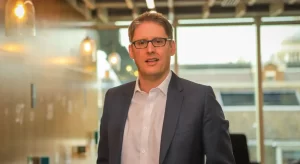
The head of the UK’s biggest business group has said most bosses “secretly” want all of their staff to return to working in offices.
Tony Danker, director-general of the CBI, said the “whole world of work” had “gone crazy” since the pandemic.
Many companies have changed policies on remote working since Covid restrictions eased, with staff offered the chance to work from home and offices.
Mr Danker said working patterns would be talked about “for a few years”.
Speaking to the BBC, the boss of the CBI, which represents 190,000 UK businesses, said he had “no idea” where working patterns were “going to land”.
“You ask most bosses, everybody secretly wants everyone to come back into the office,” he said.
“I just don’t think that’s going to happen overnight. I think we are all coping with this….but we’re going to be talking about this for a few years.”
Companies in many industries have been wrestling with whether to allow remote work practices to continue since Covid restrictions have been removed.
Some sectors, such as banking, signalled early on that they would expect staff to return to the office, while others allow remote working indefinitely. Many places have opted for a mix.
Flexible working policies splits opinions. Some have claimed working from home makes staff unproductive, while over half of women in a BBC survey said working from home helped career progression.
Recent research by the online recruitment platform LinkedIn found a third of companies in the UK were planning to cut back on flexible working in the coming months, although nearly two-thirds of workers said they were more productive in a hybrid or remote work environment.
Mr Danker made the comments about office working in response to a discussion about the UK’s labour market. Currently, businesses are short of staff, with many leaving the workforce since the pandemic.
According to the Office for National Statistics, the number of people who are economically inactive – which is people aged between 16 and 64 not looking for work – has been at a higher level since the start Covid.
The House of Lords’ economic affairs committee highlighted retirement, increased sickness, changes to migration and the UK’s aging population was also contributing to the current tightness in the labour market.
Mr Danker said he wanted to create “pathways” for people to return to work for those who were on universal credit, or had been unable to work due to sickness.
“We are going to work with companies to make sure that they can bring you health support and wraparound care to absorb yourself back into work,” he added.
When the economy reopened following the Covid lockdowns, job vacancies surged. The number of openings on offer has dropped since, but it is still above pre-pandemic levels.
One way to attract new staff other than to offer pay rises has been to offer flexible working. In December last year, the government proposed employees be given the right to ask for flexible working from their first day at a new job.
Asked about board members and executives playing golf on Fridays and joking about only working Tuesday, Wednesday and Thursday stunting Britain’s economic growth, Mr Danker said: “You want me to launch an all out attack on Friday golfers?
“Look. Yeah, you might be right. I think the whole world of work is totally gone crazy. We have no idea where it’s going to land.”
Reflecting on what Mr Danker said, Rachel Clough, UK Country Lead at SD Worx, commented:“Some business leaders might be banking on a mass return to the office, but in our new working world it’s about truly meeting employee wants and needs, as well as ‘selling the appeal’ of offices to workforces.
As Gen-Z and younger employees emerge into the talent pool amid a war for talent, businesses find themselves in the tricky position of getting everything right when it comes to salary, flexibility and appetite for technology, to name just a few core expectations.
Job hunters are increasingly holding the cards in this market, meaning employers have to demonstrate unprecedented levels of agility to not only attract employees but to retain them.
Employees are being very clear about what they want, so employers will have to keep dialling up transformation efforts if they’re to convince workforces of the in-person benefits the office brings.
Recently, we’ve seen huge momentum behind businesses’ drive to transform their HR processes and employee engagement strategies across Europe. At the heart of these approaches lies a common goal of making function future fit. With businesses grappling to cut through major challenges – from the war on talent to rising costs – in a tough business climate, solutions which reduce admin and free up employee time for the great human engagement that being in an office brings is critical. This realisation should be rippling through boardrooms and opportunity knocks for employers who realise the potential today.”
Read more:
Bosses secretly want staff back in office, says CBI’s Tony Danker

